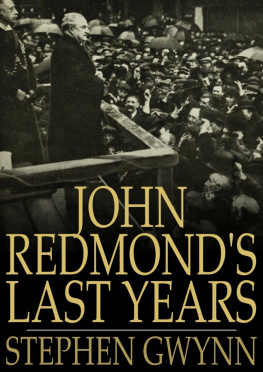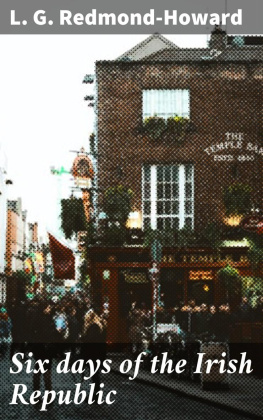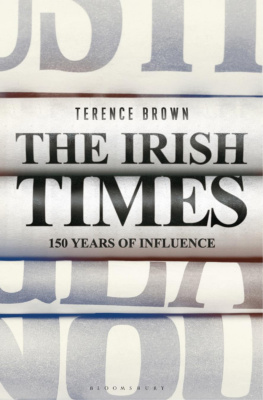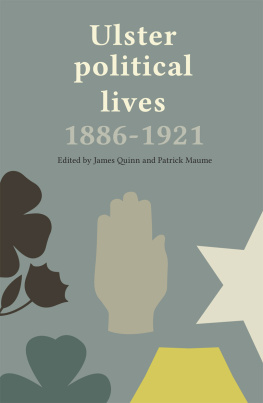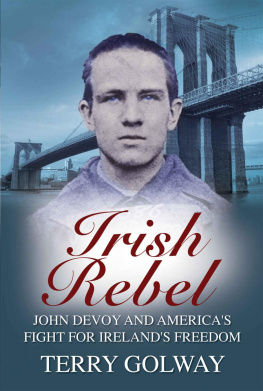JOHN REDMOND'S LAST YEARS
* * *
STEPHEN GWYNN

*
John Redmond's Last Years
First published in 1919
Epub ISBN 978-1-77659-817-5
Also available:
PDF ISBN 978-1-77659-818-2
2014 The Floating Press and its licensors. All rights reserved.
While every effort has been used to ensure the accuracy and reliability of the information contained in The Floating Press edition of this book, The Floating Press does not assume liability or responsibility for any errors or omissions in this book. The Floating Press does not accept responsibility for loss suffered as a result of reliance upon the accuracy or currency of information contained in this book. Do not use while operating a motor vehicle or heavy equipment. Many suitcases look alike.
Visit www.thefloatingpress.com
Contents
*
Preface
*
In writing this book, I have had access to my late leader's papers forthe period beginning with the war. These were placed at my disposal byhis son, Major William Archer Redmond, D.S.O., M.P. I had also theconsent of Mrs. Redmond to my undertaking the task. But for the book andfor the opinions expressed in it I am solely responsible. No conditionhaving been imposed upon me, it seemed best, for many reasons, that itshould be written, as it has been written, without consultation.
A writer in whom such a trust has been placed may well be at a loss howto express his gratitude, but can never convey the measure of hisanxiety. From those who cherish Redmond's memory, and especially fromthose who were nearest to him in comradeship and affection, I must onlycrave the indulgence which should be accorded to sincere effort.Differences of interpretation there will be in any review of pastevents, and others can claim with justice that on many points they werebetter situated for full understanding than was I. Yet for the periodwhich is specially studied, if there is failure in comprehension itcannot be excused by lack of opportunity to be thoroughly informed.
To readers at large I would say thisthat if any sentence in thesepages be uncandid or ungenerous, it is most unworthy to be found in therecord of such a man.
S.G.
Chapter I - Introductory
*
I
The time has not yet come to write the biography of John Redmond. Notuntil the history of the pledge-bound Irish Parliamentary party can betreated freely, fully and impartially as a chapter closed and ended willit be possible to record in detail the life of a man who was associatedwith it almost from its beginning and who from the opening of thiscentury guided it with almost growing authority to the statutoryaccomplishment of its desperate task; who knew, in it and for it, allvicissitudes of fortune and who gave to it without stint or reservationhis whole life's energy from earliest manhood to the grave.
But when the war came, unforeseen, shifting all political balances,transmuting the greatest political issues, especially those of which theIrish question is a type, it imposed upon men and upon nations, butabove all on the leaders of nations, swift and momentous decisions.Because that critical hour presented to Redmond's vision a greatopportunity which he must either seize single-handed or let it for everpass by; because he rose to the height of the occasion with the couragewhich counts upon and commands success; because he sought by his ownmotion to swing the whole mass and weight of a nation's feeling into anew directionfor all these reasons his last years were different inkind from any that had gone before; and as such they admit of and demandseparate study. Intelligent comprehension of what he aimed at, what heachieved, and what forces defeated him in these last years of his lifeis urgently needed, not for the sake of his memory, but for Ireland'ssake; because until his policy is understood there is little chance thatIrishmen should attain what he aspired to win for Irelandthe strengthand dignity of a free and united nation.
It is of Redmond's policy for Ireland in relation to the war, and to theevents which in Ireland arose out of the war, that this book is mainlydesigned to treat. Yet to make that policy intelligible some history isneeded of the startling series of political developments which the warinterrupted but did not terminateand which, though still recent, areblurred in public memory by all that has intervened. Further back still,a brief review of his early career must be given, not only to set theman's figure in relation to his environment, but to show that this finalphase was in reality no new departure, no break with his past, but atrue though a divergent evolution from all that had gone before.
*
Ireland, although so small in extent and population, is none the less acountry of many and locally varying racial strains; and John Redmondsprang from one of the most typical. He was a Wexfordman; that is tosay, he came from the part of Ireland where if you cross the Channelthere is least difference between the land you leave and the land yousail to; where the sea-divided peoples have been always to some extentassimilated. Here in the twelfth century the first Norman-Welsh invaderscame across. The leader of their first party, Raymond Le Gros, landed ata point between Wexford and Waterford; the town of Wexford was hisfirst capture; and where he began his conquest he settled. From thisstock the Redmond name and line descend.
Thus John Redmond came from an invading strain in which Norman and Celtwere already blended; and he grew up in a country thickly settled withmen whose ancestors came along with his from across the water. Till acentury ago the barony of Forth retained a dialect of its own which wasin effect such English as men spoke before Chaucer began to write; andeven to-day in any Wexford fair or market you will see among the strong,well-nourished, prosperous farmers many faces and figures which anartist might easily assimilate to an athletic example of the traditionalJohn Bull. Redmond himself, hawk-faced and thick-bodied, might have beentaken for no bad reincarnation of Raymond Le Gros. To this extent he wasless of a Celt than many of his countrymen; but he was assuredly nonethe less Irish because he was a Wexfordman. The county of his birth wasthe county which had made the greatest resistance to English power inIreland since Sarsfield and his "Wild Geese" crossed to Flanders. Bornin 1857, he grew up in a country-side full of memories of events thenonly some sixty years old; he knew and spoke with many men who had beenout with pike or fowling-piece in 1798. Rebel was to him from boyhood upa name of honour; and this was not only a phase of boyish enthusiasm. Inhis mature manhood, speaking as leader of the Irish party, he told theHouse of Commons plainly that in his deliberate judgment Ireland'ssituation justified an appeal to arms, and that if rebellion offered areasonable prospect of gaining freedom for a united Ireland he wouldcounsel rebellion on the instant.
But if he was always and admittedly a potential rebel, no man was everless a revolutionary. As much a constitutionalist as Hampden orWashington, he was so by temperament and by inheritance. The traditionof parliamentary service had been in his family for two generations.Two years after his birth his great-uncle, John Edward Redmond, fromwhom he got his baptismal names, was elected unopposed as Liberal memberfor the borough of Wexford, where his statue stands in the market-place,commemorating good service rendered. Much of the rich flat land whichlies along the railway from Wexford to Rosslare Harbour was reclaimed bythis Redmond's enterprise from tidal slob. On his death in 1872 the seatpassed to his nephew William Archer Redmond, whose two sons were Johnand William Redmond, with whom this book deals. Thus the present MajorWilliam Archer Redmond, M.P., represents four continuous generations ofthe same family sent to Westminster among the representatives ofNationalist Ireland.

